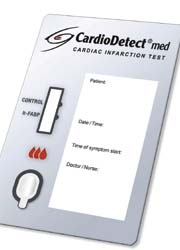Mobile test detects infarction in minutes
The earlier a cardiac infarction is detected the better the patient's chances of survival. However, because tests for cardiac infarction check for protein molecules that are released from heart muscle during cell necrosis, and these enter the blood very slowly, it can take three hours to gain a reliable result.

The real importance of the release of myocardial proteins during a cardiac infarction became clear only in recent years. As a result, in 1999, the European Society for Cardiology (ESC) and the American College of Cardiology (ACC) produced a new definition of acute myocardial infarction, based on the occurrence of typical kinetic courses of biochemical markers (specific myocardial proteins) from myocardial necrosis, for example combined with ischemic symptoms.1
Measuring the cardiac protein troponin T is now the norm, but several companies have been trying to establish other testing systems, using markers with shorter phases of release than troponin T.
They have had no greater success.
To diagnose cardiac infarction as quickly as possible, particularly fast markers are needed, such as the h-FABP (fatty acid-binding protein).
Now, Rennesens GmbH, a Berlin-based bio-tech company, reports that it has developed ‘...a lab-independent, reliable and easy-to-handle rapid test in the form of an EC-card, which gives a reading of cardiac infarction in just 35 minutes of its onset. CardioDetect is highly sensitive to h-FABP. If used 20 minutes after the onset of symptoms, the card will provide an accurate result in 35 minutes, says Rennesens, adding that the test device is safe and easy to use.
Details: Wolfgang Schwarz, Marketing Manager, Rennesens GmbH. wschwarz@rennesens.de
Mobility - test kit in a pocket
The CardioDetect EC-card fits in a wallet and the user, or a non-specialist, can carry out a test anywhere, taking any necessary remedial steps before medical help arrives. No complicated instructions are needed. With an enclosed tool, the tip of a finger is pierced to obtain 2-3 drops of blood. This is put on a test field and 15 minutes later the result is readable. Results are evaluated on an easy YES/NO basis.
Although CardioDetect is designed for use by anyone, the R&D team and manufacturer see its most important potential in medical institutions, emergency services and geriatric care. Sports clubs or airlines could also use the card.
01.07.2003











